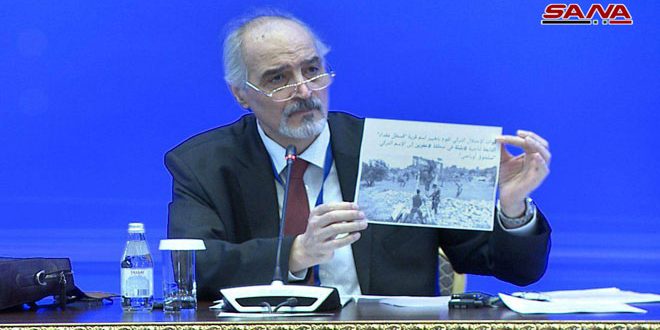ASTANA- Head of the Syrian Arab Republic’s delegation to Astana’s 11th meeting Dr. Bashar al-Jaafari said that the Turkish regime’s non commitment to the Sochi Agreement on Idleb encouraged the terrorist organizations to continue targeting civilians in Aleppo, Hama and Lattakia, stressing that if the agreement is not implemented through policy, it will be implemented by others methods, SANA reported.
During a press conference at the conclusion of Astana’s 11th meeting on Syria Thursday, al-Jaafari said that ” the final statement issued at Astana’s 11th meeting is balanced and reflects the complexities of the political scene,” adding that many of important points were discussed over the past two days .”The focus was mainly for us and other delegations, especially the Russian and Iranian guarantor states , as well as the Kazakh side on the deterioration of the situation in Idleb with the Turkish regime’s non respect for obligations falling under the Sochi Agreement.”
Al-Jaafari said that non- commitment of the Turkish regime in implementing Astana understandings regarding de-escalation zone in Idleb and as the Sochi agreement stipulates, with the Turkish authorities guaranteeing the withdrawal of terrorist groups from a belt extending at 15 to 20 deep to the west, which has not been implemented. “That enabled the terrorist organizations to target Aleppo city with shells containing chemical substances more than once a time in an indication that there is a decision to escalate terrorism by those who support the terrorist organizations positioned in Idleb, especially Jabhat al-Nusra and Daesh (ISIS) and their affiliated groups.”
The Senior Diplomat said that the Turkish regime is the first suspect in the facilitation, procession and use of chemical weapons by terrorists in Idleb against the civilians in Aleppo, which constitutes a grave escalation that contradicts Sochi Agreement.
Al-Jaafari emphasized that continuation of combating terrorism in Idleb by the Syrian state, in cooperation with the allies, is open as Syria will not be patient anymore and there is a limited time for the Turkish authorities to implement Sochi Agreement and make the terrorists retreat to a depth of 20 km to the west.
Al-Jaafari clarified that the Turkish troops, which have entered illegitimately the Syrian territories in north-west Syria, are changing the features of the areas they are spread in through attempts to give the Turkish identity to areas they are occupying where they have changed the name of a Syrian town called “Qastal Mikdad” to Saljouq Aubasi, in addition to imposing the Turkish currency (Lira) instead of the Syrian pound as well as raising the Turkish flag over these areas and changing schools’ curriculum.
Al-Jaafari wondered whether the terrorist organizations in Idleb including foreign mercenary terrorists- supported and protected by Turkish regime- can be described as Syrian opposition.
Is “the Turkistan Islamic Party” a moderate Syrian opposition or is it non-moderate? … What about ‘Hurras al-Din’ organization, which declared allegiance to Zawahiri in Afghanistan i.e. Al-Qaeda terrorist organization? All of these foreign terrorists are in Idleb under protection of the Turkish authorities,” al-Jaafari elaborated.
Al-Jaafari stressed on the necessity that all the foreign troops whose presence in Syria is illegitimate withdraw, including the US troops positioned in al-Tanf area and al-Rukban Camp and other areas in northeast of the country, the Turkish forces positioned in many areas and the British and the French forces whose presence in the country is less.
“What has been said should be part of the international political discourse of the UN and the other countries keen on implementing the UNSC resolutions in terms of ending up the crisis in Syria.
“There is a clear discrepancy in the stances taken by the US, France and Britain, which have already agreed on the UN Security Council resolutions on being committed to Syria’s sovereignty; meanwhile these countries have been deploying their troops in Syria. This confirms a flagrant failing in behaviors of these states and in their political orientations in Syria,”
Answering a question about impeding the return of the displaced Syrians , al-Jaafari said that these issues have always been discussed with Russian and Iranian guarantor states and with the UN.
“We have raised this issue strongly during the recent round of talks in Astana and affirmed the western claims cannot be reconciled to ending the crisis in Syria with the ongoing Western pressures on the non-return of the displaced Syrians home, using weak pretexts.”
If the western countries want to help Syria actually and provide help to the countries hosting the displaced , they should lift the economic measures on the country so that the displaced can return home and resume their normal life,” he concluded.

